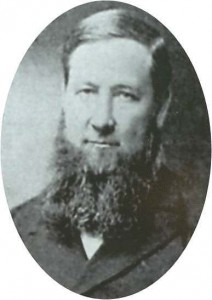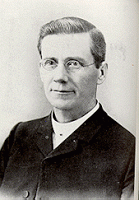 Rick Atchley takes a well known Restoration Movement slogan and updates it to reflect our most recent history: “We speak where the Bible speaks, and where the Bible is silent, we speak even more.” Oh, yeah, the silence of Scripture — is it permissive or prohibitive? If we’re honest, most of us decide based on the issue of the moment and/or our own comfort zones. Strange, but that never really was a question that concerned anybody in our churches until right after the Civil War when we were looking to divide and punish, to humble others and make ourselves feel better.
Rick Atchley takes a well known Restoration Movement slogan and updates it to reflect our most recent history: “We speak where the Bible speaks, and where the Bible is silent, we speak even more.” Oh, yeah, the silence of Scripture — is it permissive or prohibitive? If we’re honest, most of us decide based on the issue of the moment and/or our own comfort zones. Strange, but that never really was a question that concerned anybody in our churches until right after the Civil War when we were looking to divide and punish, to humble others and make ourselves feel better.
The Civil War and the resulting hatred and bitterness that lingered into and through Reconstruction in the South played a critical and undeniable role in the divisions among the Stone – Campbell churches that ultimately led to the official “split” between the Disciples of Christ and the Churches of Christ. To deny this would be to ignore the evidence. Similar splits along North and South lines occurred in the Methodist, Baptist, and Presbyterian denominations at the same times. And, no, we were not immune.
As further proof, Holloway and Foster’s Renewing God’s People offers up the issues of instrumental music in corporate worship and the American Christian Missionary Society.
While the centralized missionary organization had its detractors almost as soon as it was established in 1849, the Missionary Society was not something over which anybody in a Stone-Campbell church would have fought or divided. Until after the Civil War. Following the Society’s pro-Union resolutions and its official support of the United States military, it became the firestorm issue of the Restoration Movement. To demonstrate how the War Between the States had influenced feelings and thoughts, consider that two of the Society’s most outspoken critics were former officers of the organization. Tolbert Fanning served on the board and even addressed its annual meeting in 1859. Benjamin Franklin (no, not that one) served as the Society’s secretary for thirteen years. But after the war they both repeatedly blasted the group as unbiblical in Franklin’s American Christian Review. Their main official objection was based on the “silence of Scripture.”
Since the Bible does not specifically mention anything about multi-church organizations or boards that support a combined effort among different congregations, they argued that the Missionary Society was unscriptural. Of course, those who supported and served the Society claimed that silence in Scripture is what gave them permission to do it.
The same arguments were used in debating the issue of instrumental music in our corporate worship assemblies. While the first recorded instance of an instrument used in worship in a Stone-Campbell church was in Midway, Kentucky in 1859, it really was a post-Civil War issue. The churches that brought in pianos and organs argued that, since the Bible did not prohibit it, they were permitted to use the instruments to help their singing and to appeal to the younger generations. Opposition to this “innovation” came mostly from the South, and mostly from the same “silence of Scripture” argument. The New Testament, they claimed, authorizes congregational singing, but not musical instruments. On the other hand, those who used instruments cited the same Bible verses that gave them authority to use song books and song leaders and church buildings to aid their worship: none. 
The one man who might have done the most to hasten the division among the Stone-Campbell churches on these issues is Daniel Sommer who, in 1889, outlined his plan to save the Restoration Movement from “innovations and corruptions.” Unoriginally titled “An Address and Declaration,” Sommer’s paper proclaimed that if leaders and churches would not give up practices such as instrumental music, support of the Missionary Society, located preachers, and others, then “we cannot and will not regard them as brethren.”
On the other end of that attitude was a Stone-Campbell educator and preacher named T. B. Larimore. He was baptized in Kentucky in 1864 and later attended Franklin College near Nashville, studying under Fanning. This loyal son of the South was influenced and taught by some of the strongest opponents of instrumental music and the Missionary Society, but he refused to ever take sides on these issues. He never declared himself publicly. Larimore believed God’s Church should never divide over such trivial matters and, as a preacher of the Gospel, saw his duty as only to proclaim the good news of salvation from God in Christ. Larimore said he would have nothing to do with those questions over which “the wisest and best of men disagreed.”
 Larimore was a highly successful and influential preacher. He baptized more than ten thousand people in his lifetime. And he would preach wherever people would listen. He was invited by both Churches of Christ and Disciples of Christ and he honored each invitation. He wrote articles and religious papers for both groups. As his popularity grew he was pressured more and more to take sides on the issues that divided the Movement, but he never did. He only spoke well of people in both camps. In his words:
Larimore was a highly successful and influential preacher. He baptized more than ten thousand people in his lifetime. And he would preach wherever people would listen. He was invited by both Churches of Christ and Disciples of Christ and he honored each invitation. He wrote articles and religious papers for both groups. As his popularity grew he was pressured more and more to take sides on the issues that divided the Movement, but he never did. He only spoke well of people in both camps. In his words:
“I never call Christians or others ‘anti’s,’ ‘digressives,’ ‘mossback,’ ‘tackies,’ or ‘trash.’ I concede to all, and accord to all, the same sincerity and courtesy as the Golden Rule demands.”
I’m not sure what it means to be called a “tackie” — only Doug Foster knows. But Larimore’s legacy during one of the most contentious times in our history is that he spoke only of matters of first importance. He taught and lived, by word and deed, that the only way for God’s Church to avoid the evils of division and maintain Christ’s vision for unity was to allow freedom in matters of opinion. And he kept on preaching.
Peace,
Allan
The 1800s? The Civil War? I urge you to re-check your dates. Maybe it’s me but I get a 21st century feel from some of this. “Oh to be like thee” – or at least, Larimore.